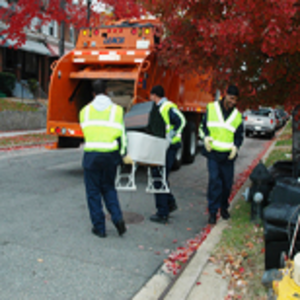DC Dept. of Public Works receives award for fleet use of biofuels

Photo: DC Department of Public Works
August 30, 2019
BY DC Department of Public Works
Washington, D.C.’s Department of Public Works, on behalf of the Bowser administration, received a Fleet Leadership Award for its use of clean fuels in district vehicles by the Greater Washington Clean Cities Coalition. The award was presented Aug. 28 at the GWCCC awards luncheon held in downtown D.C. DPW fuels and maintains more than 4,000 district government vehicles. It has mandated the use of 100-percent biodiesel in most of D.C. government’s diesel fleet, as well as a 85-percent ethanol fuel and 15-percent gasoline mix (E85) in all district flex fuel vehicles.
In its attempt to further reduce greenhouse gas emissions, DPW launched a pilot program last winter enabling the use of 100-percent biodiesel fuel in six refuse trucks. The pilot reduced direct emissions over DPW’s diesel-powered counterparts by 75 percent.
Advertisement
Advertisement
“DPW’s diesel refuse trucks cause the highest amount of emissions per vehicle in the entire district fleet,” said Chris Geldart, DPW director. “We were looking for a solution to maximize emissions reductions while minimizing any effect on operations,” Geldart said, adding that the agency has ordered 17 new trucks that are 100 percent biodiesel to be delivered in fiscal year 2020.
Biodiesel is typically blended into traditional diesel at levels up to 20 percent biodiesel and 80 percent diesel. Biodiesel is a cleaner fuel solution produced from waste fats and oils, reducing greenhouse gas emissions up to 86 percent compared to traditional diesel.
D.C.’s fleet of government trucks consumed more than 1.1 million gallons of diesel fuel in 2018. Nearly 120,000 gallons of this was biodiesel, resulting in a greenhouse gas emission reduction of more than 1,000 tons. Additionally, the district’s light-duty fleet consumed more than 283,000 gallons of E85 last year, providing a greenhouse gas emission reduction of another 480 tons.
Advertisement
Advertisement
DPW received a similarly titled award last year focused solely on its use of biodiesel. This year’s award is based on the results of GWCCC’s annual Department of Motor Vehicles fleet survey (submitted to the U.S. DOE) finding a broad use of both biodiesel and E85 by DPW.
“The Department of Public Works has always shown a willingness to pilot new alternative fuel vehicle initiatives, especially those that can help the district save money and contribute to a cleaner environment,” said Ira. H. Dorfman, GWCCC executive director. “The department’s current initiative to convert garbage packers to B100 is one example of how DPW is saving money and reducing its carbon footprint.”
DPW provides essential city services in two distinct program areas: environmental services/solid waste management and parking enforcement. Both contribute to making district streets and public spaces clean, safe, attractive and accessible for residents, businesses, commuters and visitors.
Related Stories
Airbus is taking a significant step toward scaling the adoption of sustainable aviation fuel (SAF) by testing a new “Book and Claim” approach. This initiative aims to boost both supply and demand for SAF worldwide.
Signature Aviation, the world’s largest network of private aviation terminals, has announced the expansion of its blended SAF offering at six new locations across Europe following multiple blended SAF supply agreements.
Virgin Australia has entered an agreement with Viva Energy to SAF for its flights departing from Proserpine, Queensland. The SAF will consist of Jet A1 and a 30-40% synthetic blend component made from waste and residue feedstocks.
The largest single volume order of sustainable aviation fuel (SAF) by a DB Schenker customer has been placed by Mercedes-Benz. The order is for approximately 13,000 metric tons of SAF and is expected to reduce CO2 emissions by 40,000 metric tons.
ADM and Loyola University Chicago Searle Biodiesel Lab have joined the expanding B20 Club. Founded in 2014, the B20 Club is a partnership between the Illinois Soybean Association and American Lung Association.
Upcoming Events










